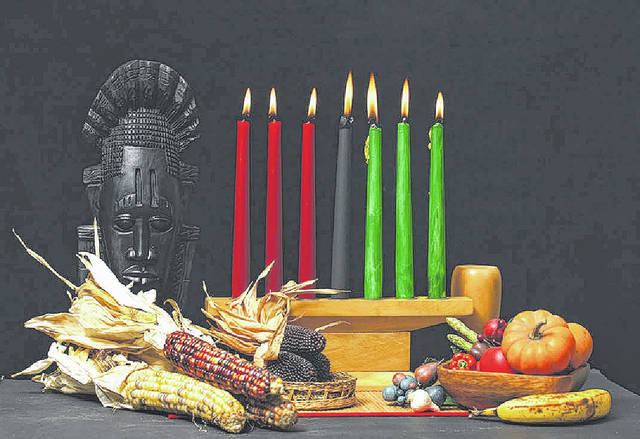
With the final flame of Hanukkah flickering out last week, there’s another holiday under way that involves the daily lighting of candles, cultural history, gift-giving, and bountiful meals.
On Tuesday, many people of African heritage began the weeklong celebration known as Kwanzaa, which is sometimes spelled Kwanza and is pronounced “kwahn-zuh.” The holiday, which always runs from Dec. 26 to Jan. 1, derives its name from the Swahili phrase “matunda ya kwanza,” meaning “first fruits.”
Created in 1966 by noted black American scholar, educator and activist Maulana Karenga as a way of defining a unique black American identity and promoting black Americans’ knowledge of their African history and past, Kwanzaa is becoming increasingly popular, even being celebrated on many college campuses. In addition, the U.S. Postal Service has issued Kwanzaa stamps and there are Kwanzaa greeting cards.
Gerlach Flowers by Sharron, 1501 Washington Ave., Piqua, also features a Kwanzaa bouquet among its holiday arrangements.
Larry Hamilton, a historian and author, as well as a retired Piqua educator, said he has observed Kwanzaa “on an intermittent basis.” Though he does not celebrate it as a regular holiday, Hamilton said he supports the principles of Kwanzaa, which are represented by the candles of the seven-branched kinara.
The candles — one black, three red and three green — each symbolize a different principle: unity (umoja), self-determination (kujichagulia), collective responsibility (ujima), cooperative economics (ujamaa), purpose (nia), creativity (kuumba) and faith (imani).
In addition to lighting the kinara, Kwanzaa ceremonies come with food, which can range from African creole, Cajun catfish and West Indian jerk chicken, to collard greens, gumbo and black-eyed- peas. Decorations are often colorful, and can include the Bendera Ya Taifa — the traditional Kwanzaa flag — as well as African masks, painted ceramic bowls, and displays of fruit and vegetable arrangements that symbolize a bountiful harvest.
Though some people observe both Christmas and Kwanzaa, not all black people celebrate Kwanzaa and not all people who acknowledge Kwanzaa are black. Though the celebration does center around African heritage and the importance black history, people from other races and ethnic backgrounds are always welcome to take part in the rituals of Kwanzaa


